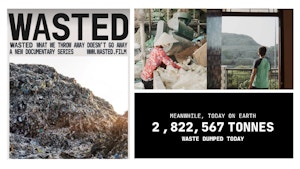#poverty News

Food & Agriculture
Climate and finance crises could leave 600 million hungry by 2030
IFAD chief sounds alarm on global hunger saying millions could face food insecurity by 2030 without swift action.

Policy & Finance
Jailing local wildlife poachers will not help deliver environmental justice: Thai judge Suntariya Muanpawong
Thailand is still used as a hub for wildlife trafficking networks, and Muanpawong tells Eco-Business that judicial innovation is needed to address the transboundary nature of wildlife trade. Putting the poor in prisons doesn't help, she says.

Policy & Finance
Lack of job growth for Bangladesh’s youth fuels campus protests
Mass student-led protests against changes in government jobs quotas highlight deep economic challenges faced by youth.

Policy & Finance
Empty beds, lost jobs: The price of India’s crackdown on NGO funds
Modi's government cancelled FCRA licences for thousands of charities, halting foreign funds; critics say move costs jobs, services.
#poverty Opinion

Most Rohingya end up in the Aceh province of Indonesia where they not only face hostility from locals, but more uncertainty about their future.

The focus of Delhi’s existing solid waste management policies is not on curtailing ever-increasing consumption and production but making waste invisible or incinerating it for profit.

Carbon & Climate
The 1.5°C target for global warming must prevail
Limiting global warming is a matter of social justice, human rights and long-term development, and this imperative remains even if we cross the 1.5°C threshold. The 1.5°C target remains relevant.

For Southeast Asia, it need not be a binary choice between maintaining status quo or pushing for 'degrowth'. Reducing emissions without neglecting job growth imposes lower social costs, and can be a pathway to take for the region.
Policy & Finance
Delhi's dilemma: a growing economy and growing unemployment
Carbon & Climate
Climate change poses dire health and human rights risks
#poverty Videos

Launched as policymakers lock horns with petrochemicals lobbyists over a treaty to end plastic pollution, the documentary produced by Eco-Business asks why opportunities to solve humanity's waste crisis are being wasted. It will premiere in Singapore and screen on the sidelines of the upcoming COP28 climate summit.

Policy & Finance
‘No income, insufficient aid’ for Oriental Mindoro fisherfolk after oil spill: Research group
A coalition of scientists and environmentalists found “widespread economic impacts” for communities in the Philippine province, heightening calls for accountability from the sunken tanker reportedly chartered by a San Miguel Corp subsidiary.

After 20 years without electricity, more than 50 households in Cebu's poorest district have been provided with solar energy, financed by carbon offsets.

Southeast Asia's largest energy consumer has been slow to transition to renewables, but recent policies point to greater expansion of the country's solar, tidal and geothermal energy production.
#poverty Podcasts

Policy & Finance
‘Never give in to fear’: Nobel peace prize nominee and Filipino Indigenous leader Vicky Tauli Corpuz
In celebration of Indigenous Peoples' month in the Philippines, the former United Nations special rapporteur tells the Eco-Business Podcast about her lifelong work to empower communities in Asia’s most dangerous country for environmental defenders.
#poverty Press Releases

United Nations Development Programme
Rich countries attain record human development, but half of the poorest have gone backwards: UNDP

Asian Development Bank (ADB)
Climate change impacts severely impede SDGs: ADB-UN report

United Nations Economic and Social Commission for Asia and the Pacific
New UN report: Along with gender, where people live key factor in determining levels of poverty, inequality in APAC

World Economic Forum
Top organisations unlock new investments to support world’s most vulnerable

Economic and Social Commission for Asia and the Pacific (ESCAP)
UN forum underscores need for collaborative action to ensure crisis resilient urban futures













